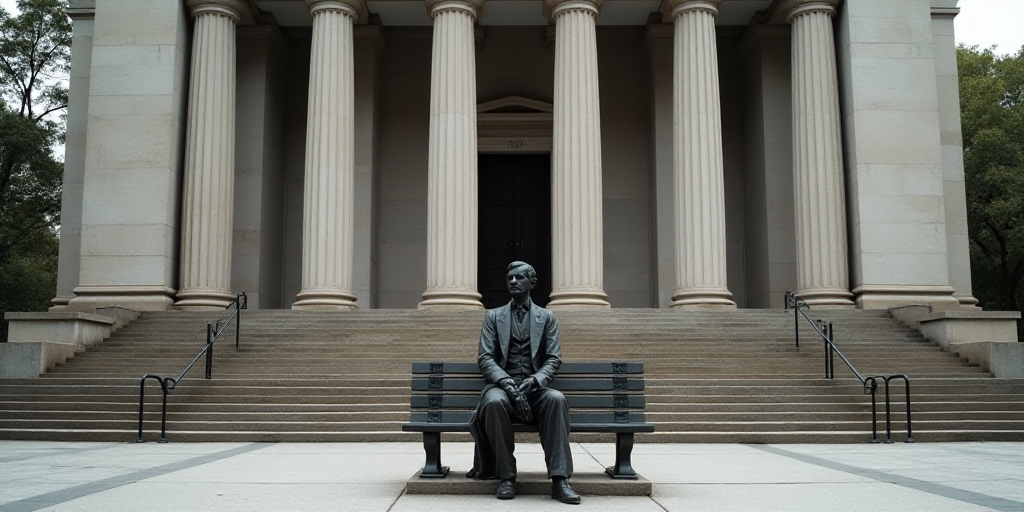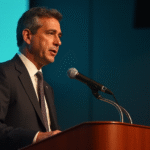Student and Faculty Concerns Over Immigration Detentions
Biliana, a South American student at Columbia University, is preparing for exams with apprehension, fearing arrest by immigration police. Faculty members struggle to save their research amidst budget cuts imposed by President Donald Trump’s administration. The New York City campus is closing its academic year in crisis.
“We just try to go about our classes normally,” Biliana, 29, said, requesting to be cited under a false name and concealing her country of origin due to fear. “But the situation is terrifying,” she added, explaining that she and her friends avoid posting on Twitter or expressing political opinions for fear of being identified as too politically charged.
When activists protest against the Gaza war outside, like when they recently occupied a library, Biliana stays away out of fear of being photographed and associated with the movement.
“Critical Level of Anxiety”
On Thursday, 80 people were detained and released shortly afterward. The university president condemned the protest, just before final exams, and immediately called the police. U.S. Secretary of State Marco Rubio stated that the immigration status of the “vandals” would be reviewed and threatened those he called “pro-Hamas thugs.”
For newly elected student body president Oscar Wolfe, “whether or not they are part of the pro-Palestinian movement, the level of anxiety is critical” among international students.
Wolfe mentioned that he has only experienced “a normal month of academics” since arriving on campus in September 2023, right before the Hamas attacks on October 7 and the subsequent Israel-Gaza Strip war, which sparked a massive protest movement.
Budgetary Impact and Research Cuts
Trump’s offensive, accusing universities of enabling antisemitism amidst protests against the Gaza war, has also affected Columbia’s budget. The institution lost $400 million in federal aid.
Unlike Harvard, which sued the government over the cuts, Columbia claims that negotiations are still ongoing. However, on Wednesday, interim president Claire Shipman announced that the institution eliminated 180 research positions.
The impact extends further. Psiquiatry professor Rebecca Muhle explains that for one of her autism research projects, her National Institutes of Health (NIH) grant “hasn’t been cut but isn’t funded; it’s in limbo.”
“I can’t hire anyone or make large purchases because I don’t have the next stage of funding,” she lamented. “It’s chaos, and science isn’t done in chaos.”
Many grants are in similar situations, but go unnoticed because they aren’t officially cut.
“The First Act”
History professor Matthew Connelly, specializing in state secrets and their declassification, was notified of the withdrawal of two grants from the National Endowment for the Humanities (NEH) “without any reason.”
The funds supported a digital archiving training program for historical data, “one of the major challenges” faced by researchers in the future. Connelly lamented that those who lose access to these training courses will be affected.
Despite the challenges, Connelly remains undeterred:
“Universities are a target because everything we do is completely contrary to the Trump administration’s agenda. If we stop teaching, training our students, and researching, we’d be giving them a victory.”
“This isn’t just an attack on Columbia,” Wolfe added. “This is the first act of an attack on civil society.”
Key Questions and Answers
- What is the main issue affecting Columbia University? The university faces a crisis due to budget cuts imposed by President Trump’s administration, impacting both students and faculty.
- How are students and faculty affected by these cuts? Students fear arrest during exams, while faculty struggle to save their research projects due to limited funding.
- What specific budget cuts has Columbia University experienced? The university lost $400 million in federal aid and eliminated 180 research positions.
- How have research projects been impacted? Many grants are in limbo, with no guarantee of future funding, causing researchers to hesitate on hiring and major purchases.
- What is the significance of the grant withdrawals from the National Endowment for the Humanities (NEH)? The withdrawal of two grants supporting a digital archiving training program poses challenges for future researchers.






